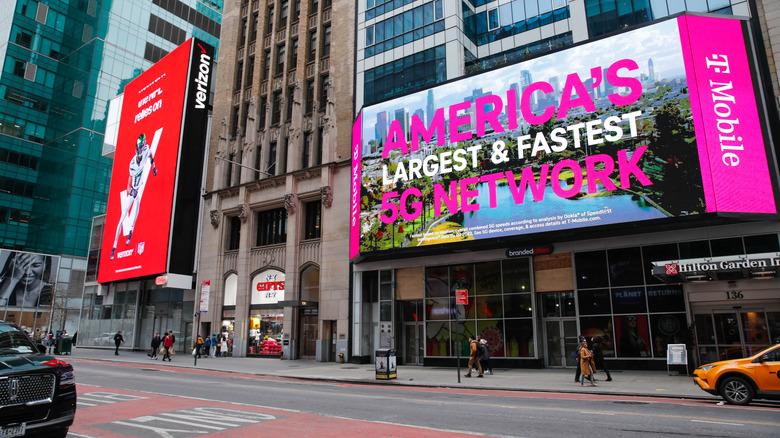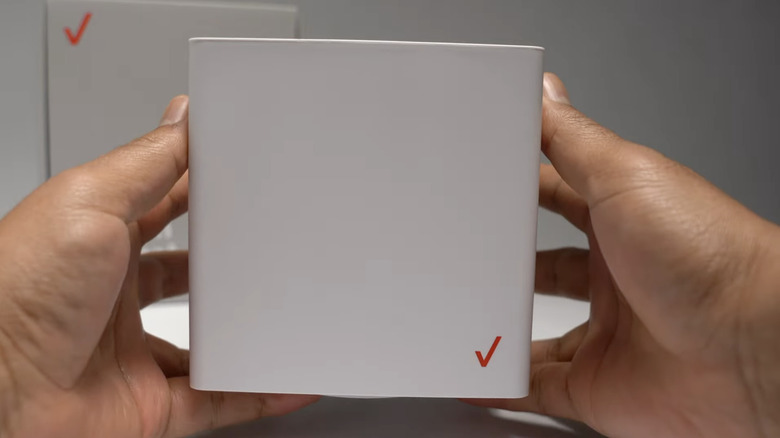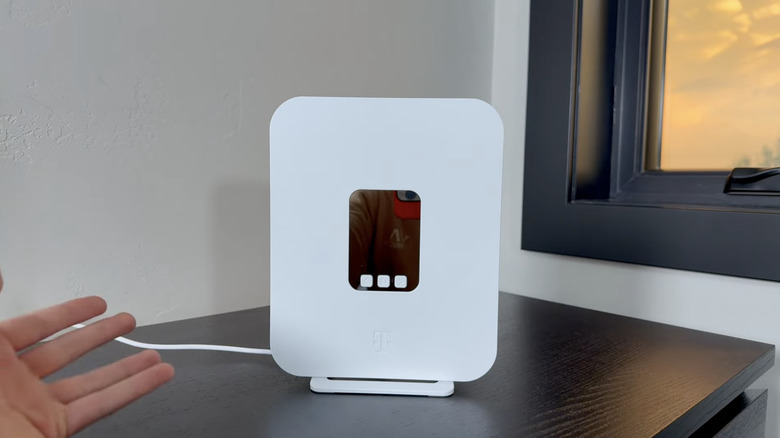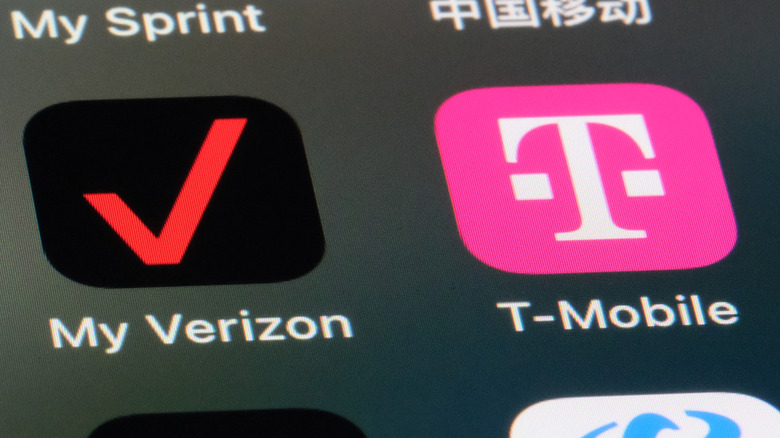Verizon Vs. T-Mobile Home Internet: How Do They Compare In Price, Speed, & Coverage
The internet and how we access it have changed in many ways since it started reaching widespread saturation in the late 1990s. The original home connections, over copper phone lines, gave way to much faster broadband connections in the form of DSL and especially cable, with fiber optic service to the home picking up steam as major telecoms like Verizon engaged in mass fiber cable deployment efforts across the United States. And the rise of more powerful cell phones allowed wireless providers to throw their hats in the ring, first for traditional mobile phone service, then adding "hotspot" capabilities to allow the connection to be shared with other devices. Once 5G wireless service achieved widespread penetration, with speeds being competitive to wired service, it made all the sense in the world to push dedicated 5G connections as a new option for home service.
As they are in the mobile world, Verizon and T-Mobile are two of the leaders in the 5G home internet space. Both have competitively priced service with free hardware, but there are some big differences between the two. One includes all applicable taxes and regulatory fees in the advertised prices, while the other doesn't. One has four tiers of service, including a data-capped "backup" internet plan for those with hardwired broadband service, while the other has just two tiers. Let's examine how T-Mobile and Verizon's 5G ISP options stack up against each other and try decoding which ISP works best for which customers under which circumstances.
What do I need to know about Verizon 5G home internet?
As of this writing, Verizon has two different plans available for 5G home internet users. For $50 per month ($35 if bundled with a qualifying Verizon 5G mobile plan), there's Verizon 5G Home, which offers maximum speeds of 300Mbps down and 20Mbps up. If you need faster service, there's Verizon 5G Home Plus for $70 per month ($55 with a qualifying Verizon 5G mobile plan), which has maximum speeds of one gigabit per second down and 75Mbps up. Both plans have unlimited data without a cap and don't require a contract, while also not charging any equipment fees for Verizon's 5G gateway and wireless router. All of the above price points also include all applicable taxes and regulatory fees.
Reviews of Verizon's service are generally positive. CNET scored it a 7.2 out of 10, itemized out to a 7.0 for speed, a 7.5 for value, and a 7.0 for customer care, singling out the clearly stated pricing, "Faster download speeds than other fixed wireless services," and lack of data caps or contracts as positives. Conversely, they were frustrated by the lack of speed consistency, especially since home internet accounts have lower network priority with Verizon than the carrier's mobile users do. HighSpeedInternet.com gave it four stars out of five but were frustrated by the limited availability.
What do I need to know about T-Mobile 56 home internet?
When it comes to 5G home internet, T-Mobile offers double the number of plans that Verizon has. The primary plan is Rely Home Internet at $50 per month with AutoPay ($35 if bundled with a voice plan) for up to 318Mbps down/56Mbps up. Stepping up to Amplified Home Internet for $10 more gets you a more "premium" 5G gateway model, extra cybersecurity benefits, and advanced support, as well as increasing the download speed to 415Mbps, while another $10 gets you All-In Home Internet. That plan is basically the Amplified tier plus a Wi-Fi Mesh access point, access to the ad-supported tiers of Hulu and Paramount+, and access to T-Mobile Tuesdays perks. Finally, $20 per month with AutoPay gets you Home Internet Backup, which offers up Rely's speeds with a data cap of 130GB, which T-Mobile's guidance classifies as "enough for 7 days of typical use." Taxes and regulatory fees are not included in the aforementioned rates.
Professional reviews of the service are largely positive, with CNET scoring it 7.4 out of 10, broken down as 6.5 for speed, 7.5 for value, and 8.0 for customer care. Overall, they gave T-Mobile basically the same assessment that they gave Verizon as far as speed variability and tower priority behind mobile customers. Crosstalk Solutions was also positive, but acknowledged that if you have options, it's not necessarily a superior option to cable, much less fiber to the home services such as Verizon Fios.
Which is the best pick for who?
If nothing else, of the two options, Verizon's flavor of 5G home internet has the advantage of offering much more transparent pricing than T-Mobile's service does. And with how the services are priced, Verizon bundling the taxes and fees means that, despite both companies having the same sticker price, the Verizon option costs less at the entry level for unlimited service. And if you need more oomph, Verizon's Plus plan offers a higher maximum download speed of one gigabit than anything T-Mobile offers. So with all else being equal, Verizon seems like the best bet for anyone who's interested in going with a 5G internet service provider as their primary internet connection.
Of course, as always with wireless service, there's also a chance that one carrier may be much better than the other where you live. It's best to check coverage maps for more details.



